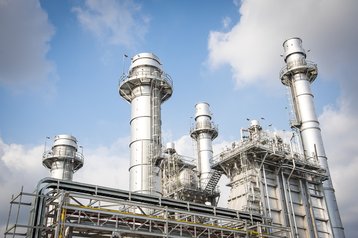As the demand for artificial intelligence (AI) data centers continues to boom in the United States, energy companies providing natural gas are poised to benefit from the trend. According to a recent report by the Wells Fargo Investment Institute (WFII), natural gas will remain a key power source for new data center facilities being constructed across the country.
Despite efforts by data center operators to source power from renewable sources, natural gas still accounts for 43% of US energy demand, according to the Energy Information Administration (EIA). This means that companies providing natural gas will be well-positioned to service the power needs of these new facilities.
“We believe that US natural gas production capacity and reserves are sufficient to meet growing demand, with infrastructure being the key constraint in balancing supply with this demand growth over time,” said Ian Mikkelsen, equity sector analyst at WFII. He noted that this will provide midstream companies with incremental growth opportunities and higher utilization of existing assets, ultimately extending the terminal value of natural gas infrastructure.

The report notes that while data center operators are seeking to power their facilities with renewable sources, such as solar and wind power, natural gas will remain a stable part of the energy mix in the near future. This is because natural gas-powered electricity production produces 430g of CO2 per kWh, which is cleaner than coal-fired power stations but still emits higher carbon than solar, wind, and nuclear power to be fully classified as green.
As a result, midstream energy companies focused on natural gas and with broad interstate operations are well-positioned to benefit from this trend. The WFII expects these companies to see incremental growth opportunities and higher utilization of existing assets, ultimately extending the terminal value of their natural gas infrastructure.
This demand for AI and other high-tech services provides opportunities for Nigeria and other African countries that have under-tapped gas reserves. In 2023, Nigeria had the largest natural gas reserves in Africa, with about 5.94 trillion standard cubic meters of proven natural gas reserves, and an estimated 202 trillion cubic feet (tcf) of untapped proven gas reserves. It also has the 9th largest proven reserves globally.
Harnessing the potential productivity of the country’s domestic gas sector and enhancing the local value chain can provide significant economic returns for Nigeria’s digital future, with an estimated addition of US$18.3 billion of Gross Value Added (GVA) annually to the domestic economy. Adding gas to power AI data centers positions the country as a home for hyperscalers, adds thousands of full-time jobs, and helps to mitigate environmental impacts by integrating cleaner energy solutions. Nigeria’s Rack Centre is already using gas and reportedly saves $10m yearly.
Investing in domestic gas infrastructure and expanding pipeline networks ensures reliable supply chains for data centers and other critical facilities. This infrastructure development not only supports urban and industrial growth but also enhances rural electrification, bridging the digital divide across Nigeria.
Nigeria has a transformative opportunity to harness natural gas for AI data centers. By capitalizing on its abundant natural resources, Nigeria can pave the way for a prosperous digital economy while addressing global energy challenges in an environmentally responsible manner.




